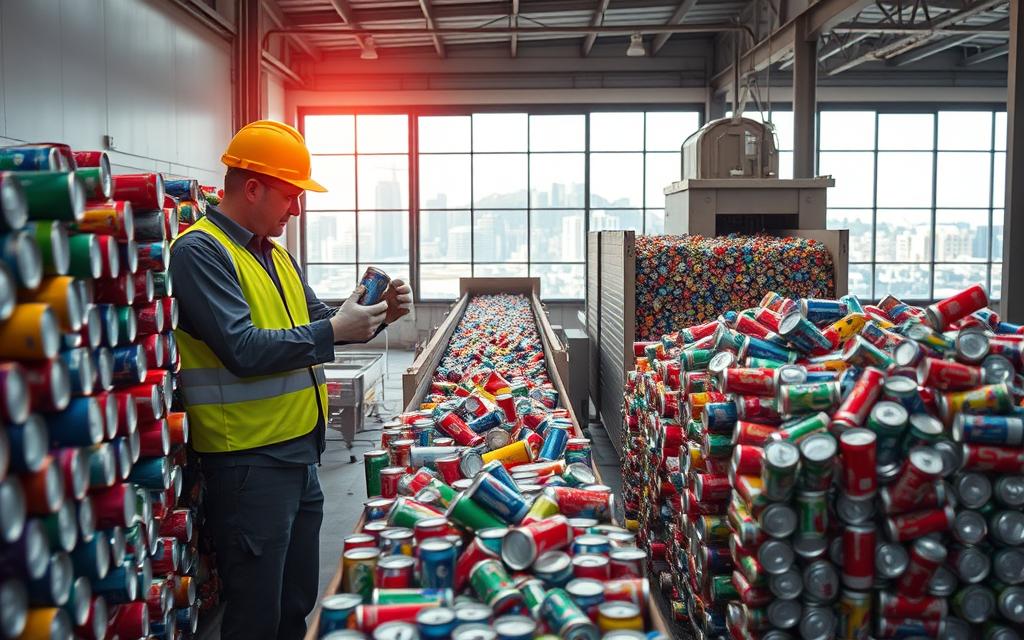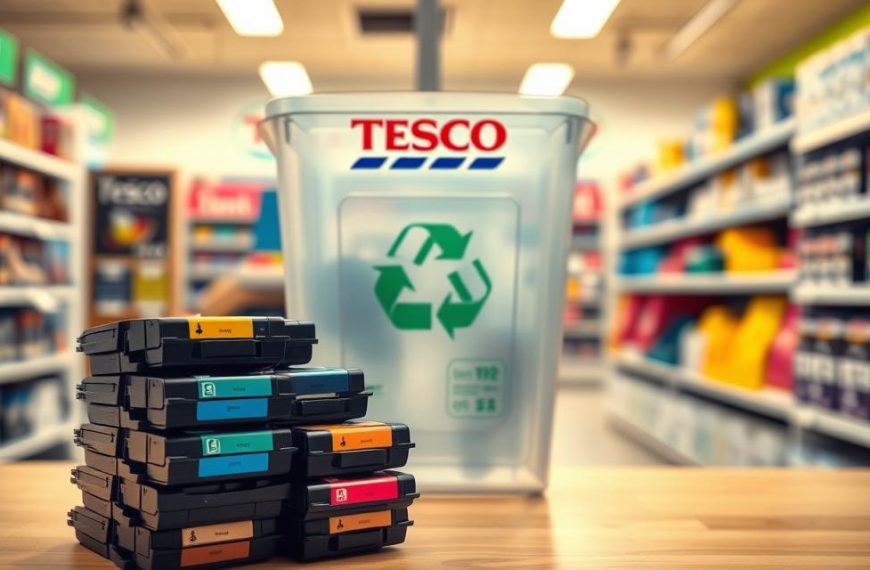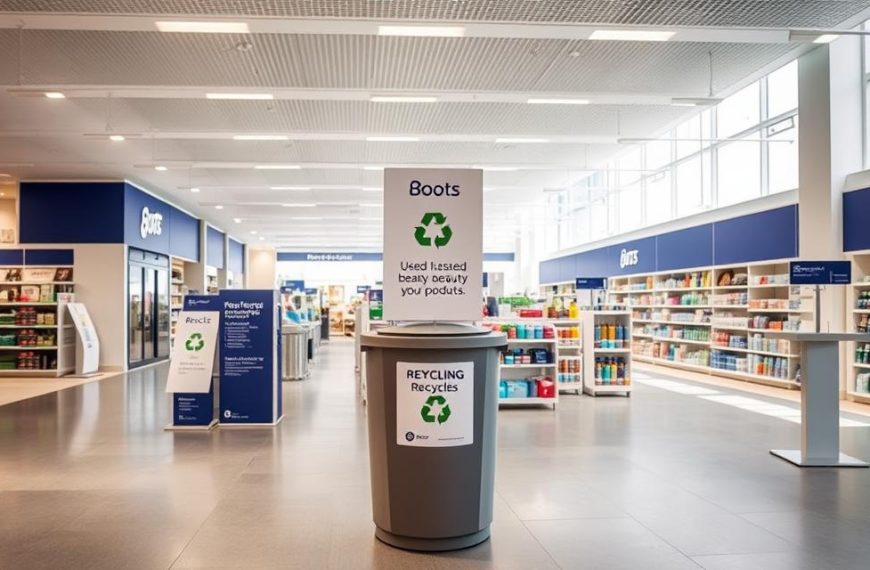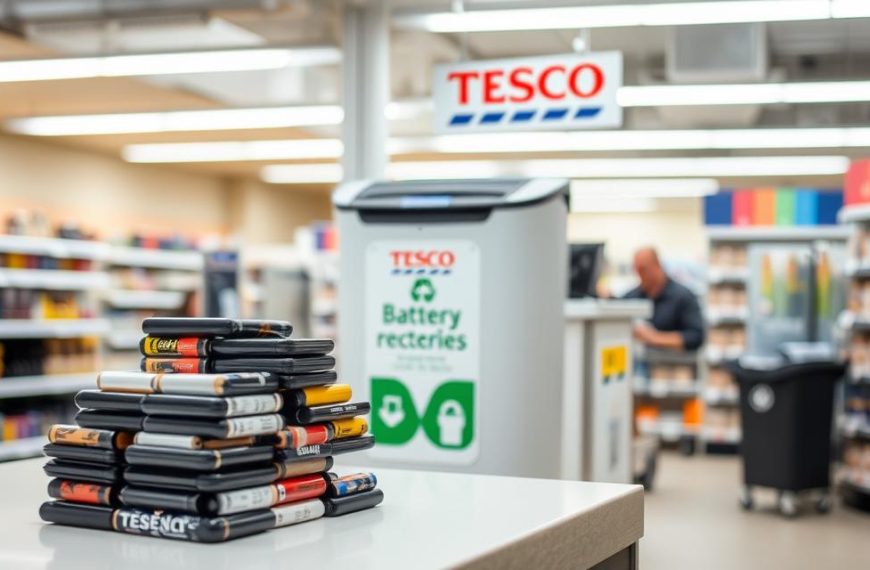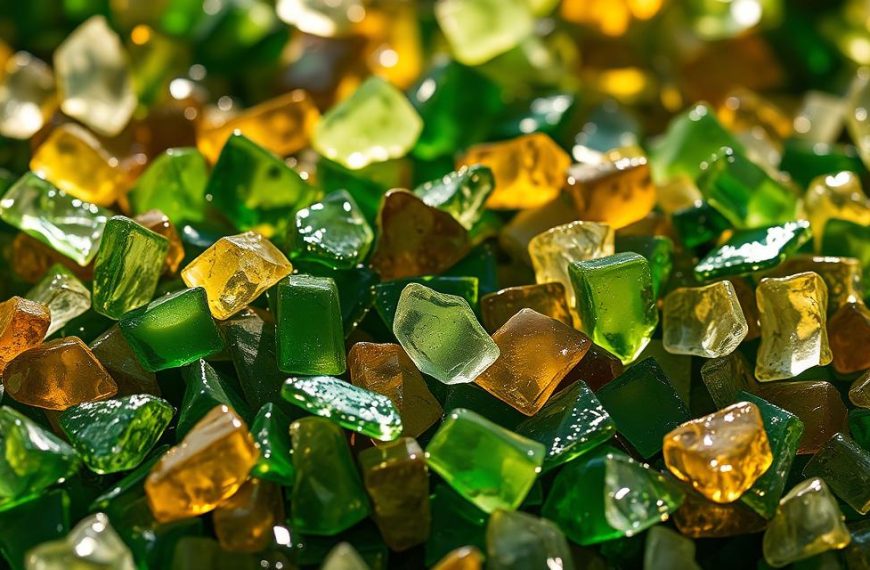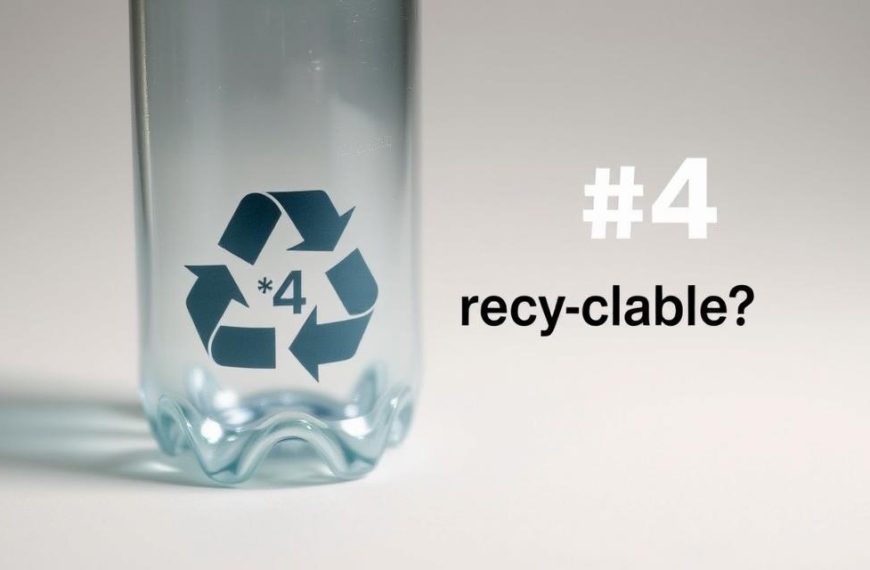Recycling aluminum cans offers both financial rewards and environmental benefits. Aluminum is a highly valuable material, with scrap prices fluctuating based on market demand. On average, you can earn around $0.55 per pound, making it a worthwhile effort for those looking to make extra cash.
For example, collecting approximately 6,000 cans can yield about $100. In bulk, a ton of aluminum can fetch between $1,100 and $1,400, depending on regional rates. This highlights the potential for significant earnings while contributing to environmental preservation.
Recycling aluminum saves up to 95% of the energy required for new production. Additionally, some states offer bottle bills, providing up to $0.15 per can. This dual benefit makes recycling a smart choice for both your wallet and the planet.
Understanding the Value of Recycling Aluminum Cans
Aluminum cans hold significant value due to their recyclability and demand in manufacturing. This lightweight metal is infinitely recyclable, making it a preferred material for industries worldwide. The scrap market for aluminum cans thrives because they can be melted down and reused without losing quality.
Why Aluminum Cans Are Valuable
The value of aluminum lies in its efficiency. Recycling it saves up to 95% of the energy needed for new production. This makes cans a sustainable choice for manufacturers. Additionally, the demand for recycled aluminum continues to grow, driving its prices higher in the market.
Current Market Prices for Aluminum Cans
On average, aluminum cans fetch around $0.55 per pound. However, regional disparities exist. For example, California offers up to $2 per pound, while prices in Wisconsin hover around $0.36. These variations are influenced by local demand and scrap availability.
Factors Influencing Aluminum Can Prices
Several factors affect the prices of aluminum cans. Location plays a significant role, as regions with higher demand offer better rates. Quantity also matters; larger batches often command premium prices. Clean, sorted cans are more valuable than contaminated ones. For more insights, check out the real value of aluminum cans.
How to Calculate Your Earnings from Recycling Cans
Determining your earnings from aluminum can collection involves understanding weight and market rates. By knowing the number of cans and their weight, you can estimate your potential income. This process is straightforward but requires attention to detail.
How Many Cans Make a Pound?
On average, 32 aluminum cans weigh one pound. Each can typically weighs around 14-15 grams, or 0.03 pounds. This metric is crucial for calculating your total scrap value. For example, 1,600 cans would weigh approximately 50 pounds.
How Many Cans Do You Need to Make $100?
The number of cans required to earn $100 depends on the prices in your area. At $0.55 per pound, you’d need around 5,000 cans. In states like Michigan, where the deposit rate is $0.10 per can, 1,000 cans can yield the same amount. Always check local rates for accuracy.
Calculating the Value of a Single Can
A single aluminum can is worth about $0.02 at an average rate of $0.55 per pound. However, this value can vary based on factors like can size (12oz vs. 24oz) and condition. Pristine cans often fetch higher prices than dented ones. Use tools like bathroom scales or industrial weigh stations for precise measurements.
For real-time scrap prices, consider using mobile apps. These tools help you stay updated on market trends and maximize your earnings. Additionally, ensure your cans are clean and free of liquid residue to avoid deductions at scrap yards.
Where to Find Aluminum Cans for Recycling
Locating aluminum containers for recycling can be a profitable venture with the right strategy. Focus on high-yield spots like offices, parks, and events. In 2021, 71% of aluminum cans were recycled, proving their abundance.
Collecting Cans at Home and Work
Start with your own household and workplace. Break rooms in offices often accumulate 1,500+ cans yearly. Designate bins for aluminum to streamline collection.
Exploring Public Spaces for Cans
Public areas like parks and festivals yield large volumes. Events like Lollapalooza recover up to 3 tons of scrap. Always respect local laws—use public bins and avoid trespassing.
Partnering with Friends and Family
Team up with neighbors for shared profits. A 50/50 split incentivizes participation. Restaurants and venues may also collaborate for bulk materials.
Equip yourself with gloves and magnets to separate steel. Crushing cans saves space and reduces odors. With these tactics, turning aluminum into income becomes effortless.
The Environmental Benefits of Recycling Aluminum Cans
Recycling aluminum containers significantly impacts both the environment and the economy. This metal is infinitely recyclable, making it a cornerstone of sustainable practices. By reusing aluminum, we reduce energy consumption, minimize waste, and support eco-friendly manufacturing.
Reducing Energy Consumption
Recycling aluminum saves up to 95% of the energy required for new production. For example, one recycled can saves enough energy to power a TV for three hours. This efficiency makes the process a key player in reducing global energy demands.
Compared to bauxite mining, which is energy-intensive and environmentally damaging, recycling is a cleaner alternative. The lifecycle of aluminum—from collection to smelting and rolling—ensures minimal energy loss.
Minimizing Landfill Waste
In the U.S., 2.7 million tons of aluminum end up in landfills annually. Recycling diverts this waste, with 65 billion cans recycled in 2022 alone. This reduces landfill space and prevents harmful materials from polluting the environment.
Communities like Toledo have used recycling programs to fund school initiatives, showcasing the broader impact of these efforts.
Supporting Sustainable Manufacturing
Recycled aluminum is a key component in closed-loop manufacturing. Companies like Ball Corp use 85% recycled content in their products, reducing their carbon footprint. This approach aligns with global climate goals, including net-zero targets.
Extended Producer Responsibility (EPR) programs are expanding nationwide, encouraging industries to adopt sustainable practices. The carbon footprint of recycled aluminum is just 0.5kg CO2 per kg, compared to 12kg for new production.
| Benefit | Impact |
|---|---|
| Energy Savings | 95% reduction vs. new production |
| Landfill Diversion | 65 billion cans recycled in 2022 |
| Carbon Footprint | 0.5kg CO2 per kg recycled |
Conclusion: Maximizing Your Earnings and Impact
Turning aluminum into income is a smart way to boost your earnings while supporting sustainability. With prices ranging from $0.01 to $0.15 per can, the potential for profit is significant. To optimize your efforts, crush and sort your scrap, and stay updated on market trends using tools like Scrap Monster or the iScrap App.
Combining strategies, such as leveraging deposit states and scrap yards, can maximize your returns. For example, 1,000 cans can earn $20 in most areas, but in Michigan, the same amount can yield $150. This flexibility ensures you get the most out of your efforts.
Beyond financial gains, recycling aluminum offers a 95% energy savings compared to new production. Every can you recycle contributes to a cleaner planet. Start today by auditing your home and connecting with local recyclers. Together, we can make a difference—one can at a time.
FAQ
Why are aluminum cans valuable for recycling?
What are the current market prices for aluminum cans?
FAQ
Why are aluminum cans valuable for recycling?
Aluminum cans are highly valuable because aluminum is a lightweight, durable, and infinitely recyclable material. It retains its quality even after multiple recycling processes, making it a sought-after resource in industries like beverage and automotive manufacturing.
What are the current market prices for aluminum cans?
Prices fluctuate based on demand, location, and market conditions. As of today, aluminum cans typically fetch between
FAQ
Why are aluminum cans valuable for recycling?
Aluminum cans are highly valuable because aluminum is a lightweight, durable, and infinitely recyclable material. It retains its quality even after multiple recycling processes, making it a sought-after resource in industries like beverage and automotive manufacturing.
What are the current market prices for aluminum cans?
Prices fluctuate based on demand, location, and market conditions. As of today, aluminum cans typically fetch between $0.30 to $0.50 per pound at scrap yards or recycling centers. Always check local rates for the most accurate pricing.
How many aluminum cans make a pound?
On average, it takes about 24 to 32 aluminum cans to make one pound, depending on their size and weight. Beverage containers like soda cans are lighter, while larger containers may weigh more.
Where can I find aluminum cans for recycling?
You can collect cans at home, workplaces, or public spaces like parks and events. Partnering with friends, family, or local businesses can also help you gather more containers for recycling.
How does recycling aluminum cans benefit the environment?
Recycling aluminum reduces energy consumption by up to 95% compared to producing new aluminum. It also minimizes landfill waste and supports sustainable manufacturing practices, making it an eco-friendly choice.
How can I calculate the value of a single aluminum can?
Divide the current price per pound by the number of cans needed to make a pound. For example, if aluminum is $0.40 per pound and it takes 30 cans to make a pound, each can is worth approximately $0.013.
What factors influence the price of aluminum cans?
Market demand, global aluminum prices, location, and the condition of the cans all play a role. Clean, uncrushed cans often fetch higher rates at recycling centers.
FAQ
Why are aluminum cans valuable for recycling?
Aluminum cans are highly valuable because aluminum is a lightweight, durable, and infinitely recyclable material. It retains its quality even after multiple recycling processes, making it a sought-after resource in industries like beverage and automotive manufacturing.
What are the current market prices for aluminum cans?
Prices fluctuate based on demand, location, and market conditions. As of today, aluminum cans typically fetch between
FAQ
Why are aluminum cans valuable for recycling?
Aluminum cans are highly valuable because aluminum is a lightweight, durable, and infinitely recyclable material. It retains its quality even after multiple recycling processes, making it a sought-after resource in industries like beverage and automotive manufacturing.
What are the current market prices for aluminum cans?
Prices fluctuate based on demand, location, and market conditions. As of today, aluminum cans typically fetch between $0.30 to $0.50 per pound at scrap yards or recycling centers. Always check local rates for the most accurate pricing.
How many aluminum cans make a pound?
On average, it takes about 24 to 32 aluminum cans to make one pound, depending on their size and weight. Beverage containers like soda cans are lighter, while larger containers may weigh more.
Where can I find aluminum cans for recycling?
You can collect cans at home, workplaces, or public spaces like parks and events. Partnering with friends, family, or local businesses can also help you gather more containers for recycling.
How does recycling aluminum cans benefit the environment?
Recycling aluminum reduces energy consumption by up to 95% compared to producing new aluminum. It also minimizes landfill waste and supports sustainable manufacturing practices, making it an eco-friendly choice.
How can I calculate the value of a single aluminum can?
Divide the current price per pound by the number of cans needed to make a pound. For example, if aluminum is $0.40 per pound and it takes 30 cans to make a pound, each can is worth approximately $0.013.
What factors influence the price of aluminum cans?
Market demand, global aluminum prices, location, and the condition of the cans all play a role. Clean, uncrushed cans often fetch higher rates at recycling centers.
FAQ
Why are aluminum cans valuable for recycling?
Aluminum cans are highly valuable because aluminum is a lightweight, durable, and infinitely recyclable material. It retains its quality even after multiple recycling processes, making it a sought-after resource in industries like beverage and automotive manufacturing.
What are the current market prices for aluminum cans?
Prices fluctuate based on demand, location, and market conditions. As of today, aluminum cans typically fetch between
FAQ
Why are aluminum cans valuable for recycling?
Aluminum cans are highly valuable because aluminum is a lightweight, durable, and infinitely recyclable material. It retains its quality even after multiple recycling processes, making it a sought-after resource in industries like beverage and automotive manufacturing.
What are the current market prices for aluminum cans?
Prices fluctuate based on demand, location, and market conditions. As of today, aluminum cans typically fetch between $0.30 to $0.50 per pound at scrap yards or recycling centers. Always check local rates for the most accurate pricing.
How many aluminum cans make a pound?
On average, it takes about 24 to 32 aluminum cans to make one pound, depending on their size and weight. Beverage containers like soda cans are lighter, while larger containers may weigh more.
Where can I find aluminum cans for recycling?
You can collect cans at home, workplaces, or public spaces like parks and events. Partnering with friends, family, or local businesses can also help you gather more containers for recycling.
How does recycling aluminum cans benefit the environment?
Recycling aluminum reduces energy consumption by up to 95% compared to producing new aluminum. It also minimizes landfill waste and supports sustainable manufacturing practices, making it an eco-friendly choice.
How can I calculate the value of a single aluminum can?
Divide the current price per pound by the number of cans needed to make a pound. For example, if aluminum is $0.40 per pound and it takes 30 cans to make a pound, each can is worth approximately $0.013.
What factors influence the price of aluminum cans?
Market demand, global aluminum prices, location, and the condition of the cans all play a role. Clean, uncrushed cans often fetch higher rates at recycling centers.
FAQ
Why are aluminum cans valuable for recycling?
Aluminum cans are highly valuable because aluminum is a lightweight, durable, and infinitely recyclable material. It retains its quality even after multiple recycling processes, making it a sought-after resource in industries like beverage and automotive manufacturing.
What are the current market prices for aluminum cans?
Prices fluctuate based on demand, location, and market conditions. As of today, aluminum cans typically fetch between
FAQ
Why are aluminum cans valuable for recycling?
Aluminum cans are highly valuable because aluminum is a lightweight, durable, and infinitely recyclable material. It retains its quality even after multiple recycling processes, making it a sought-after resource in industries like beverage and automotive manufacturing.
What are the current market prices for aluminum cans?
Prices fluctuate based on demand, location, and market conditions. As of today, aluminum cans typically fetch between $0.30 to $0.50 per pound at scrap yards or recycling centers. Always check local rates for the most accurate pricing.
How many aluminum cans make a pound?
On average, it takes about 24 to 32 aluminum cans to make one pound, depending on their size and weight. Beverage containers like soda cans are lighter, while larger containers may weigh more.
Where can I find aluminum cans for recycling?
You can collect cans at home, workplaces, or public spaces like parks and events. Partnering with friends, family, or local businesses can also help you gather more containers for recycling.
How does recycling aluminum cans benefit the environment?
Recycling aluminum reduces energy consumption by up to 95% compared to producing new aluminum. It also minimizes landfill waste and supports sustainable manufacturing practices, making it an eco-friendly choice.
How can I calculate the value of a single aluminum can?
Divide the current price per pound by the number of cans needed to make a pound. For example, if aluminum is $0.40 per pound and it takes 30 cans to make a pound, each can is worth approximately $0.013.
What factors influence the price of aluminum cans?
Market demand, global aluminum prices, location, and the condition of the cans all play a role. Clean, uncrushed cans often fetch higher rates at recycling centers.
.30 to
FAQ
Why are aluminum cans valuable for recycling?
Aluminum cans are highly valuable because aluminum is a lightweight, durable, and infinitely recyclable material. It retains its quality even after multiple recycling processes, making it a sought-after resource in industries like beverage and automotive manufacturing.
What are the current market prices for aluminum cans?
Prices fluctuate based on demand, location, and market conditions. As of today, aluminum cans typically fetch between $0.30 to $0.50 per pound at scrap yards or recycling centers. Always check local rates for the most accurate pricing.
How many aluminum cans make a pound?
On average, it takes about 24 to 32 aluminum cans to make one pound, depending on their size and weight. Beverage containers like soda cans are lighter, while larger containers may weigh more.
Where can I find aluminum cans for recycling?
You can collect cans at home, workplaces, or public spaces like parks and events. Partnering with friends, family, or local businesses can also help you gather more containers for recycling.
How does recycling aluminum cans benefit the environment?
Recycling aluminum reduces energy consumption by up to 95% compared to producing new aluminum. It also minimizes landfill waste and supports sustainable manufacturing practices, making it an eco-friendly choice.
How can I calculate the value of a single aluminum can?
Divide the current price per pound by the number of cans needed to make a pound. For example, if aluminum is $0.40 per pound and it takes 30 cans to make a pound, each can is worth approximately $0.013.
What factors influence the price of aluminum cans?
Market demand, global aluminum prices, location, and the condition of the cans all play a role. Clean, uncrushed cans often fetch higher rates at recycling centers.
.50 per pound at scrap yards or recycling centers. Always check local rates for the most accurate pricing.
How many aluminum cans make a pound?
On average, it takes about 24 to 32 aluminum cans to make one pound, depending on their size and weight. Beverage containers like soda cans are lighter, while larger containers may weigh more.
Where can I find aluminum cans for recycling?
You can collect cans at home, workplaces, or public spaces like parks and events. Partnering with friends, family, or local businesses can also help you gather more containers for recycling.
How does recycling aluminum cans benefit the environment?
Recycling aluminum reduces energy consumption by up to 95% compared to producing new aluminum. It also minimizes landfill waste and supports sustainable manufacturing practices, making it an eco-friendly choice.
How can I calculate the value of a single aluminum can?
Divide the current price per pound by the number of cans needed to make a pound. For example, if aluminum is
FAQ
Why are aluminum cans valuable for recycling?
Aluminum cans are highly valuable because aluminum is a lightweight, durable, and infinitely recyclable material. It retains its quality even after multiple recycling processes, making it a sought-after resource in industries like beverage and automotive manufacturing.
What are the current market prices for aluminum cans?
Prices fluctuate based on demand, location, and market conditions. As of today, aluminum cans typically fetch between $0.30 to $0.50 per pound at scrap yards or recycling centers. Always check local rates for the most accurate pricing.
How many aluminum cans make a pound?
On average, it takes about 24 to 32 aluminum cans to make one pound, depending on their size and weight. Beverage containers like soda cans are lighter, while larger containers may weigh more.
Where can I find aluminum cans for recycling?
You can collect cans at home, workplaces, or public spaces like parks and events. Partnering with friends, family, or local businesses can also help you gather more containers for recycling.
How does recycling aluminum cans benefit the environment?
Recycling aluminum reduces energy consumption by up to 95% compared to producing new aluminum. It also minimizes landfill waste and supports sustainable manufacturing practices, making it an eco-friendly choice.
How can I calculate the value of a single aluminum can?
Divide the current price per pound by the number of cans needed to make a pound. For example, if aluminum is $0.40 per pound and it takes 30 cans to make a pound, each can is worth approximately $0.013.
What factors influence the price of aluminum cans?
Market demand, global aluminum prices, location, and the condition of the cans all play a role. Clean, uncrushed cans often fetch higher rates at recycling centers.
.40 per pound and it takes 30 cans to make a pound, each can is worth approximately
FAQ
Why are aluminum cans valuable for recycling?
Aluminum cans are highly valuable because aluminum is a lightweight, durable, and infinitely recyclable material. It retains its quality even after multiple recycling processes, making it a sought-after resource in industries like beverage and automotive manufacturing.
What are the current market prices for aluminum cans?
Prices fluctuate based on demand, location, and market conditions. As of today, aluminum cans typically fetch between $0.30 to $0.50 per pound at scrap yards or recycling centers. Always check local rates for the most accurate pricing.
How many aluminum cans make a pound?
On average, it takes about 24 to 32 aluminum cans to make one pound, depending on their size and weight. Beverage containers like soda cans are lighter, while larger containers may weigh more.
Where can I find aluminum cans for recycling?
You can collect cans at home, workplaces, or public spaces like parks and events. Partnering with friends, family, or local businesses can also help you gather more containers for recycling.
How does recycling aluminum cans benefit the environment?
Recycling aluminum reduces energy consumption by up to 95% compared to producing new aluminum. It also minimizes landfill waste and supports sustainable manufacturing practices, making it an eco-friendly choice.
How can I calculate the value of a single aluminum can?
Divide the current price per pound by the number of cans needed to make a pound. For example, if aluminum is $0.40 per pound and it takes 30 cans to make a pound, each can is worth approximately $0.013.
What factors influence the price of aluminum cans?
Market demand, global aluminum prices, location, and the condition of the cans all play a role. Clean, uncrushed cans often fetch higher rates at recycling centers.
.013.
What factors influence the price of aluminum cans?
Market demand, global aluminum prices, location, and the condition of the cans all play a role. Clean, uncrushed cans often fetch higher rates at recycling centers.
Releated Posts
How to Recycle Ink Cartridges Tesco Step-by-Step
Tesco’s Clubcard ink cartridge recycling programme is an environmentally responsible initiative that rewards customers with valuable Clubcard points.…
Coat Hanger Recycling Tesco: Sustainable Practices Explained
The UK is grappling with a significant environmental issue: plastic waste from hangers. Every year, approximately 8 billion…
What Can You Recycle at Boots? A Complete List of Accepted Items
The Boots recycling scheme is a fantastic initiative that enables customers to recycle a variety of health, beauty,…
Tesco Battery Recycling: How to Recycle Batteries
The improper disposal of batteries poses a significant threat to the environment. In the UK, the average person…
